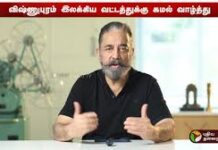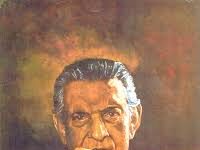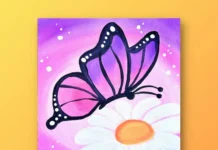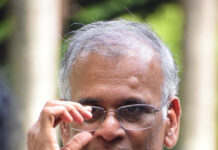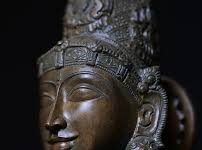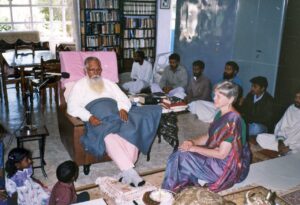 Dear Jayamohan
Dear Jayamohan
I hope you are well. I am writing to you after a long time. I have a question for you… I have been considering asking you this question for quite some time, but I have not done so. I do not know if it is right to ask. If I am wrong or if I am asking without knowing the basics, please forgive me.
You have written many times that you follow the Advaita path of Shankara. In addition, I read that Guru Nithya guided you to literature, which led to your liberation through writing.
Knowledge is the only path to salvation, and the Vedas are the only source of that knowledge. Karma Yoga is not a way to attain knowledge, but rather a preparation for the path of knowledge. Isn’t that the teaching of Shankara?
Is there a way to attain Advaita darshan and ‘mukti’ through karma? Please forgive me if I am wrong in the question.
With love
Venni

Dear Venni
Interesting question. This question is not solely based on logic, but rather draws from real-life experiences.
If someone sums it up as what Shankara ‘said,’ it would be wrong. Shankara presented neither a lesson nor advice. Advaita does not put forth a moral outlook on daily life or spirituality. It is a cosmic vision with a detailed philosophical explanation. We have to learn it directly from a competent teacher and explore it from various perspectives in order to comprehend and establish ourselves in this wisdom. Then, we must immerse ourselves in it; this process is known as ‘advaita sakshatkaram,’ or advaitic self-realization. Learning it from a book or a text is completely not advisable.
Therefore, discussing it in this short note may be even more narrow. Shankara’s wisdom is not ‘knowing something’ or a ‘collection of knowledge.’ Knowing the Vedas or any other body of knowledge does not give liberation. Even if you possess complete knowledge, it does not guarantee liberation. Knowledge has limits, and opposition (Arivinnu Adiruntu Etiruntu) is the word of Narayana Guru.
The wisdom that Shankara talks about is to completely get rid of the ignorance of a divisive outlook (avitya) and achieve the vision of oneness (Advaita). We create many dualities like Brahman-Universe, Paramatma-Jivatma, and Infinity-Everyday. The ultimate Apriori in any of our knowledge is the division ‘Us x The Universe’. We live in these dualities. Our daily lives in this world are completely filled with dualities. Wisdom is the ability to recognize it as Maya, eradicate it completely, and attain a holistic sense of oneness.
Knowing and believing in advaita is easy, but accepting it and making it our self and existence is very hard. It is the magnificent state we must achieve through completely transcending the daily reality we live in. Vedanta says that the efforts made for it are the yoga of wisdom—i.e., gnana yoga. Knowing the scriptures of wisdom is only the first step. It completes our knowledge. To make that knowledge as deep and intuitive as possible, we need the continuous guidance of a guru. We require ongoing personal inner training.
What Shankara says about ‘Vedic wisdom’ is not learning the Vedas in the traditional way. It is not learning the philosophy of the Vedas either. If so, all scholars who have learned the Vedas must be wise men on the path of liberation. Although Shankara presented the Vedas as the canon in his discourses (Sruthi Pramana), he did not emphasize Vedic education as a path of wisdom or liberation. He disregarded the Karma Kanda, which practices Vedic rituals, and instead introduced the Gnana Kanda, which pertains to knowledge of the Vedas. Shankara says that the true knowledge of the Vedas is the vision that ‘Brahma is the truth; the universe and our self-existent soul are illusion.’. He is of the opinion that the starting point of Vedanta is the end of the Vedas.
The word ‘Vedic wisdom’ (Veda Gnana) means to understand the vision of Vedantic wisdom poetically and logically. However, we can only realize it as our inner self, our depth, and our personality through internal practice or meditation (tapas). That is how any knowledge becomes ours, even a simple mundane practice like driving or typing.
Shankara called it Gnana Yoga. Narayana Guru calls it ‘becoming the knowledge and being knowledge.’. He explained it as the state where knowledge, knower, and object of knowledge become one.
jeyamohan
